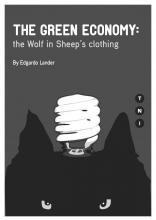The Green Economy: the Wolf in Sheep’s clothing (Edgardo Lander)
Transnational Institute (TNI) / November 2011
 Venezuelan academic Edgardo Lander critiques the proposal for a green economy put forward by the United Nations Environment Programme (UNEP) which he says is the key reference document being used by almost all other multilateral bodies.
Venezuelan academic Edgardo Lander critiques the proposal for a green economy put forward by the United Nations Environment Programme (UNEP) which he says is the key reference document being used by almost all other multilateral bodies.
He concludes the proposal does not seek a real transformation of the economic model and instead aims to “resolve the problems of the planet’s environmental crises without altering the existing power structures, nor the relations of domination and exploitation”.
He questions the promise made in the proposal that a green economy will result in high growth rates and poverty reduction in a sustainable way. He argues that the concept of sustainable development – that also promised growth and poverty reduction in a sustainable way following the 1992 Earth Summit – was used to justify the continuation of the logic of capitalist accumulation.
Lander says it is no surprise that since 1992 the environmental crisis is more severe given there has been no change in the economic model that is responsible and that the concept of sustainable development was used to give legitimacy to neo-liberal globalisation.
Lander disagrees with the UNEP analysis that the multiple crises we face (climate change, biodiversity loss, food, energy, financial etc) are a result of the “misallocation of capital” and “market failure”. He says this is a way for UNEP to avoid any structural changes by proposing all that is needed is for economic actors to have access to more information to re-direct their investments from the “brown” towards a green economy, as well as the ending of fossil fuel subsidies.
Instead of questioning the role of markets they will be expanded under the UNEP version of a green economy to include nature. He explains nature will be fully commodified because “For the good functioning of the markets, everything must have a price, opening up new spheres for speculation and capital value”. This is why initiatives such as carbon markets and Reducing Emissions from Deforestation and Forest Degradation (REDD+) are promoted.
He also highlights the lack of power analysis saying the UNEP report assumes governments are democratic and make decisions to benefit their populations. For example corporations pressure the United States government to avoid committing to a substantial emissions reduction at the UN climate change negotiations.
Lander argues the UNEP version of a green economy is being presented as the only way forward when other alternatives are being put forward by civil society including to recognise the rights of nature.
Read report
————————————
This summary was prepared by Why Green Economy?. The views expressed have been paraphrased. See the original source for more information.

Leave a Reply